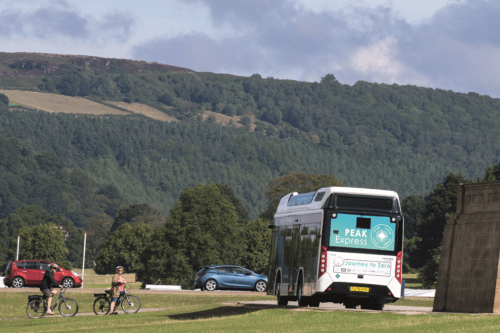
A trial of a tourist service aimed at reducing the number of cars entering the Peak District showed significant promise, its promoters say
Following a trial in 2022, a dedicated transport for tourism service which its proponents say will reduce congestion, CO2 emissions, and improve air quality, partners in the Peak Express project say that initial signs are positive. The trial assessed some of the benefits of car-free mobility within the UK’s original National Park and gathered data on the performance of both hydrogen and EV buses operating in the rural setting in anticipation of a wider network of Peak Explorer bus routes based at the new Peak Gateway leisure development near Chesterfield.
The trial considered refuelling, energy consumption, cost, customer experience and ride comfort, and overall emission savings. During the two-week trial two buses operated for an average of three hours a day, saving 1.185 tonnes of CO2 from being released into the atmosphere. A reported 72% of people who took part in the trial said they would use the paid-for service, which aims to reduce the impact of traffic congestion in Britain’s original National Park, the Peak District, something that is a growing problem for its community and visitors. The two-week trial was launched at the Chatsworth Show and completed during the first week in September last year, and was undertaken with industry partners working with Peak Gateway Properties.
The Peak Express service will offer visitors access to a hop-on, hop-off service which developers say will open up access to more experiences and attractions without the need for car parking.
During the trial the Caetano electric and hydrogen buses were operated concurrently on the same route, at the same time, with the same loads, which the developer believes is a world first. One of the most interesting results from the trial, the partners said, was the regenerative effect created by the undulating roads of the National Park; the hydrogen bus regenerated almost half of its fuel use through its braking system.
The buses covered 1,244km in total between them. The hydrogen bus used 589kWh of energy and generated 251kWh of energy through braking. A second trial, engaging a broader national customer base, is being planned for summer 2023.

